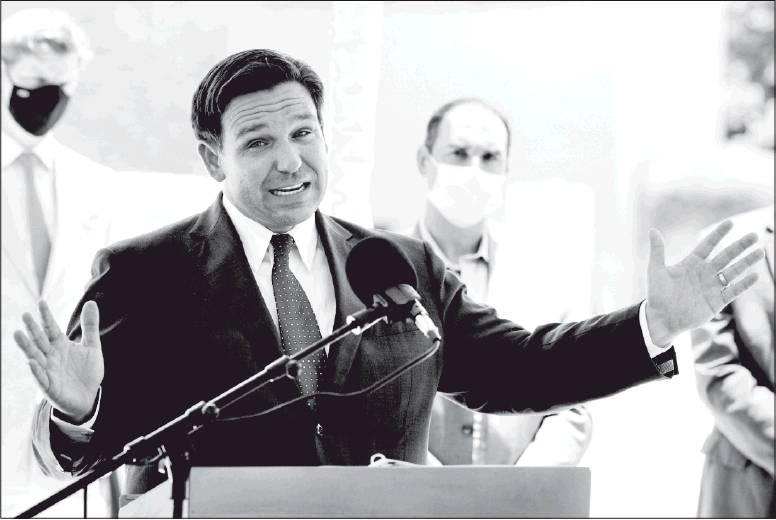Florida hits grim virus milestone |
Florida on Sunday reported a record 15,300 new corona-virus cases, the most by any state in a single day and a bleak sign of the United States’ failure to control the pandemic about six months after the first infection surfaced in the country.
The staggering number was the result of both increased testing and widespread community transmission that has affected the state’s population centers and its rural areas. It shattered previous highs of 11,694 reported by California last week and 11,571 reported by New York on April 15.
On Saturday, President Donald Trump wore a mask in public for the first time while visiting wounded service members and health care workers at Walter Reed National Military Medical Center. Trump has previously shown disdain toward face coverings amid the pandemic and had refused to wear them.
Louisiana Gov. John Bel Edwards, a Democrat, announcedanewrequirement that most people wear a mask in public. The state’s Republican lawmakers have opposed coronavirus restrictions.
Walt Disney World in Orlando reopened after having been shuttered for nearly four months, even as Florida continued to report record infections. Testing supplies in the state are running low, and some big labs are taking several days to return results, Gov. Ron DeSantis, a Republican, said at a news conference. He partly attributed the backlog to testing many asymptomatic people.
The latest spike puts Florida at the center of the country’s faltering pandemic response, highlighting the ongoing to gain an edge on the virus as the White House maintains its largely hands-off approach. The seven-day average for daily new cases nationwide, considered a more reliable indicator of the virus’ impact, has risen almost 165% over the past month, from 20,594 in the second week of June to 54,499 at the end of last week, according to the Washington Post’s tracking. The country’s daily death toll also increased last week after months of decline.
The Sunshine State has been at the forefront of the nationwide surge, with daily cases regularly exceeding 10,000 in July. An influx of coronavirus patients is straining Florida hospitals, and virus-related deaths in the state are trending upward after leveling off in the late spring. Over the past week alone, Florida reported nearly 70,000 new cases, the most of any state.
Amid the soaring numbers, DeSantis has stuck to an aggressive reopening plan. State officials recently ordered schools to reopen five days a week in the new academic year, drawing objections from local leaders. The state is also set to hold the Republican National Convention next month in Jacksonville’s VyStar Veterans Memorial Arena, an indoor facility that seats about 15,000.
DeSantis sought to project calm at his news conference Saturday, emphasizing that many new coronavirus patients are young and healthy.
“If you look at where the cases are coming from, a lot of the cases are in that between 15 and 54, which, as you can see, those are not the age groups that are producing significant fatalities,” he said. “In fact, if you are under 55, and you don’t have significant comorbidities, the fatality rate for this is incredibly, incredibly low.”
He added that he believed the risk to schoolchildren was low, even though health experts say it remains unclear what role children and teenagers play in transmitting the virus. He also voiced concern about Florida’s rate of positive test results climbing into the double digits, saying, “This is something that we’re looking at very seriously.”
Shortly before Florida announced the new cases, Education Secretary Betsy DeVos made rounds on Sunday news talk shows, where she continued to pressure schools to reopen.
In an interview on CNN, DeVos said she would like to see closed schools be the “exception” rather than the norm. “The goal needs to be that kids are learning, full-time, this fall,” she said. “Kids need to get back in the classroom.”
Asked about surging caseloads in much of the country, she replied that schools could respond to “little flare-ups” in the future but that they should generally be open for full-time learning.
DeVos added on Fox News that the Trump administration was looking at “all the options” for pulling federal funding from schools that don’t open in the fall. “American investment in education is a promise to students and their families,” she said. “If schools aren’t going to reopen ... they shouldn’t get the funds.”
Her remarks drew swift criticism from House Speaker Nancy Pelosi, while the government health official in charge of testing signaled that the virus was still spreading too quickly to allow children to return to classrooms.
DeVos, Trump and other senior administration officials spent much of last week leaning on schools to reopen. They said children suffer academically, as well as socially and emotionally, when they are away from school and said remote learning this spring was a disaster for many families, points that outside experts also have made. And they said it was impossible for some parents to go back to work if their children are at home.
Trump allies also see a political imperative in convincing voters that the nation is recovering from the pandemic, which will be hard if millions of families’ lives are still upended by school closures.
Last week, a Kaiser Family Foundation analysis estimated there are nearly 1.5 million teachers, about 1 in 4, who are older than 65 or have health conditions that put them at higher risk of serious illness if they were to contract COVID-19. Asked about the finding, DeVos said that there are ways for teachers to continue to work and that districts should work to “figure out the best scenario for those teachers.”



 RSS Feed
RSS Feed